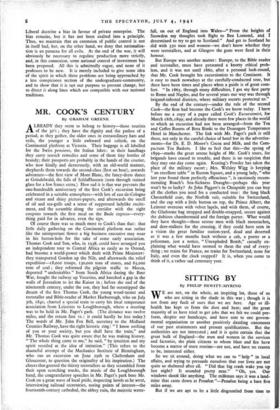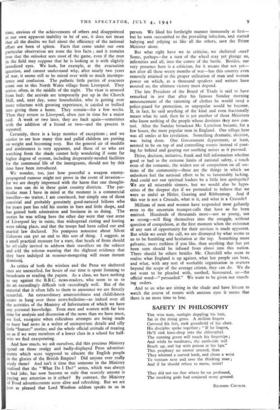SITTING BY
By PHILIP HEW
WE are not, on the whole, an inspiring lot, those of us who are sitting in the shade in this war ; though it is not from any fault of ours that we are here. Age or ill- health has kept us from the dust and heat; and the great majority of us have tried to get jobs that we felt we could per- form, despite our handicaps, and have sent to one govern- mental organisation or another positively dazzling statements of our past attainments and present qualifications. But the authorities are not interested ; and it is quite certain that the great bulk of England—the men and women in the services and factories, the plain citizens to whom blast and fire have become a matter of mere routine—are not, and have no reason to be, interested either.
So we sit around, doing what we can to " help " in local affairs, and trying to persuade ourselves that our lives are not quite so sheltered after all. " Did that big crash wake you up last night? It sounded pretty near." " Oh, yes. Our windows shook like anything. The milkman says it was a land- mine that came down at Penafon "—Penafon being a bare five miles away.
But if we are apt to be a little disgruntled from time to time, envious of the achievements of others and disappointed at our own apparent inability to be of use, it does not mean that all the doubts we feel about the efficiency of the national effort are born of spleen. Facts that come under our own particular observation are none the less facts ; and it remains true that the onlooker sees most of the game, even if the man in the field may suppose that he is looking at it with slightly jaundiced eyes. We look, for example, at the evacuation question, and cannot understand why, after nearly two years of war, it seems still to be mired over with so much incompe- tence and confusion. The pathetic little parties of evacuees come out to this North Wales village from Liverpool. They arrive, often, in the middle of the night. The vicar is aroused from bed: the arrivals are temporarily put up in the Church Hall, and, next day, some householder, who is getting ever more reluctant with growing experience, is cajoled or bullied into giving them a home. They remain—for a few weeks.
Then they return to Liverpool, often just in time for a major raid. A week or two later, they are back again—sometimes with the addition of a friend or two—and the process is repeated.
Certainly, there is a large number of exceptions ; and we rejoice to see how many thin and pallid children are putting on weight and becoming rosy. But the general air of muddle and aimlessness is very apparent, and those of us who are watching from the shade cannot help wondering if some far higher degree of system, including desperately-needed facilities for the communal life of the immigrants, should not by this time have been introduced.
We wonder, too, just how powerful a weapon enemy- propagated rumour might not prove in the event of invasion— for we are deeply impressed with the harm that one thought- less man can do in these quiet country districts. The par- ticular man I have in mind at the moment is a commercial traveller—no traitor, I am convinced, but simply one of those convivial and probably genuinely good-natured fellows who for years past has told his stories in bars and little shops, and has gained both admiration and business in so doing. The stories he was telling here the other day were that vast areas of Liverpool lay in ruins, that widespread rioting and looting were taking place, and that the troops had been called out and martial law declared. No pompous nonsense about Silent Columns can put an end to this sort of thing. I suggest, as a small practical measure for a start, that heads of firms should be off cially invited to address their travellers on the subject and add the solemn warning that the slightest evidence that they have indulged in rumour-mongering will mean instant dismissal.
As critics of both the wireless and the Press we sheltered ones are unexcelled, for hours of our time is spent listening to broadcasts or reading the papers. As a class, we have nothing to say against the B.B.C. news-readers, who seem to us to do an exceedingly difficult task t xceedingly well. But of the material that it often falls to them to announce we are fiercely resentful. An extraordinary amateurishness and childishness seems to hang over these news-bulletins—as indeed over all the activities of the Ministry of Information of which we have any. personal knowledge. Even men and women with far less time for analysis and discussion of the news than we have must, we feel, recognise when ridiculous attempts are being made to bury bad news in a welter of unimportant details and silly little "feature" stories; and the whole official attitude of treating us as if we were members of a lower class in a school for half- wits we find exasperating.
And how much, we ask ourselves, did this precious Ministry spend on those stodgy and badly-displayed Press advertise- ments which were supposed to educate the English people in the glories of the British Empire? Did anyone ever really study them? And isn't it time that someone in the Ministry realised that the " What Do I Do?" series, which was always a bad joke, has now become so stale that scarcely anyone is Paying any attention to it either? By contrast, the Ministry of Food advertisements seem alive and refreshing. But we are just as pleased that Lord Woolton seldom speaks to us in person. We liked his forthright manner immensely at first— but he soon succumbed to the prevailing Infection, and started babying and jollying us like all the others, save the Prime Minister alone.
But what right have we to criticise, we sheltered ones? Some, perhaps—for a turn of the wheel may yet plunge us, infirmities and all, into the centre of the battle. Besides, our very presence here is a criticism, for it means that not yet— not after all these weary months of war—has this country even remotely attained to the proper utilisation of man and woman power on which, as a thousand speakers and writers have assured us, the ultimate victory must depend.
The late President of the Board of Trade is said to have remarked in jest that after his famous Sunday morning announcement of the rationing of clothes he would need a police-guard for protection, so unpopular would be become. If, in fact, he said anything of the kind and even fractionally meant what he said, then he is yet another of those Ministers who know nothing of the people whose destinies they now con- trol. After the Sunday broadcast Mr. Lyttelton became, for a few hours, the most popular man in England. Our village here was all smiles at his revelation. Something dramatic, decisive, was being done. One Government department, at least, seemed to be on top of and controlling events instead of pant- ing far behind and gasping out soothing noises as it pursued.
Drive, decision, initiative, frank and full information whether good or bad to the extreme limits of national safety, a touch even of the romantic, the widest use of compulsion on all sec- tions of the community—these are the things in which we onlookers feel the national effort to be so lamentably lacking. And could not our spiritual leaders be a little less apologetic? We are all miserable sinners, but we would also be hypo- crites of the deepest dye if we pretended to believe that we were as sinful as Hitler, Goering and Ribbentrop. And if this war is not a Crusade, what is it, and what is a Crusade?
Millions of men and women have responded most gallantly even to the uncertain trumpet-calls that have so far been emitted. Hundreds of thousands more—not so young, not so strong—will fling themselves into the struggle, without question of compulsion, at the first moment when the existence of any sort of opportunity for their services is made apparent. But while we await the call, we are dismayed by what seems to us to be fumbling and hesitation at the top. Something more galvanic, more ruthless if you like, than anything that has yet been seen should be infused from above into this nation. There should be others besides Mr. Churchill who seem to realise what England is up against, what her people can bear, and what, with any sort of workable organisation in matters beyond the scope of the average citizen, they can do. We do not want to be pleaded with, soothed, humoured, or—the official word—" persuaded." We want to be given our march- ing orders.
And to us who are sitting in the shade and have leisure to watch the course of events with anxious eyes it seems that there is no more time to lose.































 Previous page
Previous page